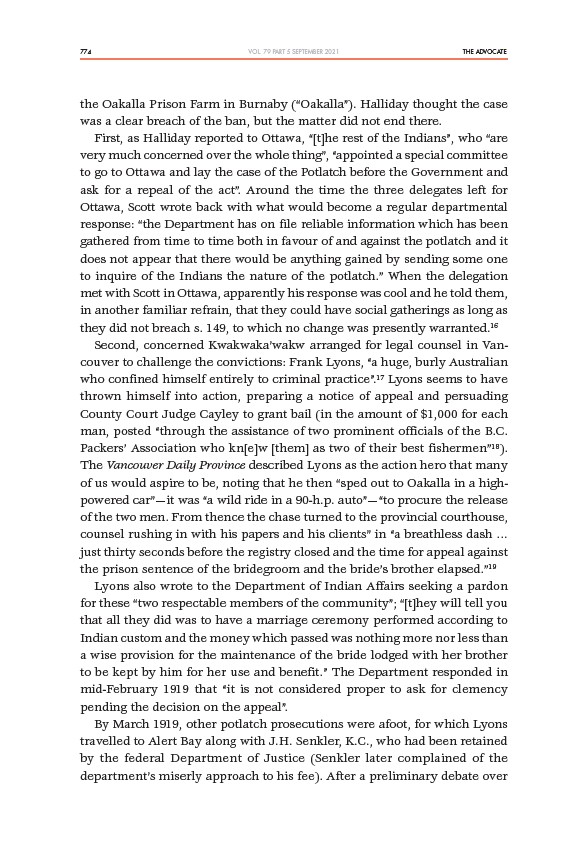
774 THE ADVOCATE
VOL. 79 PART 5 SEPTEMBER 2021
the Oakalla Prison Farm in Burnaby (“Oakalla”). Halliday thought the case
was a clear breach of the ban, but the matter did not end there.
First, as Halliday reported to Ottawa, “the rest of the Indians”, who “are
very much concerned over the whole thing”, “appointed a special committee
to go to Ottawa and lay the case of the Potlatch before the Government and
ask for a repeal of the act”. Around the time the three delegates left for
Ottawa, Scott wrote back with what would become a regular departmental
response: “the Department has on file reliable information which has been
gathered from time to time both in favour of and against the potlatch and it
does not appear that there would be anything gained by sending some one
to inquire of the Indians the nature of the potlatch.” When the delegation
met with Scott in Ottawa, apparently his response was cool and he told them,
in another familiar refrain, that they could have social gatherings as long as
they did not breach s. 149, to which no change was presently warranted.16
Second, concerned Kwakwaka’wakw arranged for legal counsel in Vancouver
to challenge the convictions: Frank Lyons, “a huge, burly Australian
who confined himself entirely to criminal practice”.17 Lyons seems to have
thrown himself into action, preparing a notice of appeal and persuading
County Court Judge Cayley to grant bail (in the amount of $1,000 for each
man, posted “through the assistance of two prominent officials of the B.C.
Packers’ Association who knew them as two of their best fishermen”18).
The Vancouver Daily Province described Lyons as the action hero that many
of us would aspire to be, noting that he then “sped out to Oakalla in a highpowered
car”—it was “a wild ride in a 90-h.p. auto”—“to procure the release
of the two men. From thence the chase turned to the provincial courthouse,
counsel rushing in with his papers and his clients” in “a breathless dash …
just thirty seconds before the registry closed and the time for appeal against
the prison sentence of the bridegroom and the bride’s brother elapsed.”19
Lyons also wrote to the Department of Indian Affairs seeking a pardon
for these “two respectable members of the community”; “they will tell you
that all they did was to have a marriage ceremony performed according to
Indian custom and the money which passed was nothing more nor less than
a wise provision for the maintenance of the bride lodged with her brother
to be kept by him for her use and benefit.” The Department responded in
mid-February 1919 that “it is not considered proper to ask for clemency
pending the decision on the appeal”.
By March 1919, other potlatch prosecutions were afoot, for which Lyons
travelled to Alert Bay along with J.H. Senkler, K.C., who had been retained
by the federal Department of Justice (Senkler later complained of the
department’s miserly approach to his fee). After a preliminary debate over